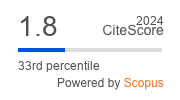Optimasi SVM Berbasis PSO pada Analisis Sentimen Wacana Pindah Ibu Kota Indonesia
Abstract
President Joko Widodo decided to move the capital city of the country outside Java. The relocation of the capital city is contained in the 2020-2024 National Medium-Term Development Plan. Community response to this has been mixed through national television and social media, especially Twitter. The tendency of Twitter users to respond to the government discourse can be seen with sentiment analysis. Sentiment analysis is one of the areas of Natural Language Processing (NLP) that builds systems for recognizing and extracting opinions. In this study, the Feature Selection PSO algorithm in the classification of the SVM model is proposed to improve the resulting accuracy in the sentiment analysis of moving capital cities. Experiments on the data of 1,319 tweets (457 positive sentiments and 862 negative sentiments) indicate an increase in accuracy by 2.09% from 79.06% to 81.15%, with the classification category is “Good Classification”.
Downloads
References
. RI, Rencana Pembangunan Jangka Menengah Nasional 2020-2024. Indonesia, 2020.
. A. S. Cahyono, “Pengaruh Media Sosial Terhadap Perubahan Sosial Masyarakat di Indonesia,” J. Publiciana, pp. 140–157, 2016.
. R. A. Maisal, A. N. Hidayanto, N. F. A. Budi, Z. Abidin, and A. Purbasari, “Analysis of Sentiments on Indonesian YouTube Video Comments : Case Study of The Indonesian Government ’ s Plan to Move the Capital City,” Int. Conf. Informatics, Multimedia, Cyber Inf. Syst., pp. 121–124, 2019.
. A. P. Kirilenko, S. O. Stepchenkova, H. Kim, and X. R. Li, “Automated Sentiment Analysis in Tourism : Comparison of Approaches,” J. Travel Res., 2017.
. U. Naseem, I. Razzak, K. Musial, and M. Imran, “Transformer Based Deep Intelligent Contextual Embedding for Twitter Sentimen Analysis,” Futur. Gener. Comput. Syst., 2020.
. A. Sharma and U. Ghose, “Sentimental Analysis of Twitter Data with respect to General Elections in India,” in Procedia Computer Science, 2020, vol. 173, no. 2019, pp. 325–334.
. J. Qiu, Z. Lin, and Q. Shuai, “Investigating the Opinions Distribution in the Controversy on Social Media,” Inf. Sci. (Ny)., 2019.
. Y. S. Mahardhika and E. Zuliarso, “Analisis Sentimen Terhadap Pemerintahan Joko Widodo Pada Media Sosial Twitter Menggunakan Algoritma Naives Bayes Classifier,” in Prosiding Sintak, 2018, pp. 409–413.
. R. K. Thakur and M. V Deshpande, “Kernel Optimized-Support Vector Machine and Mapreduce framework for sentiment classification of train reviews,” Indian Acad. Sci., vol. 44, no. 1, pp. 1–14, 2019.
. Q. Wang, K. Liu, and K. Ma, “Emotional Analysis of Public Opinions in Colleges and Universities : Based on Naive Bayesian Classification Method,” J. Phys., 2019.
. A. Tripathy, A. Agrawal, and S. K. Rath, “Classification of Sentimental Reviews Using Machine Learning Techniques,” in Procedia - Procedia Computer Science, 2015, vol. 57, pp. 821–829.
. D. Wang and Y. Zhao, “Using News to Predict on Investor Sentiment : Based on SVM a Model,” Procedia Comput. Sci., vol. 174, no. 2019, pp. 191–199, 2020.
. S. Wang, D. Li, L. Zhao, and J. Zhang, “Sample cutting method for imbalanced text sentiment classification based on BRC,” Knowledge-Based Syst., vol. 37, no. March, pp. 451–461, 2016.
. Hernawati and W. Gata, “Sentimen Analisis Operasi Tangkap Tangan KPK Menurut Masyarakat Menggunakan Algoritma Support Vector Machine , Naive Bayes Berbasis Particle Swarm Optimizition,” Factor Exacta, vol. 12, no. 3, pp. 230–243, 2019.[15] A. Faisal, Y. Alkhalifi, A. Rifai, and W. Gata, “Analisis Sentimen Dewan Perwakilan Rakyat Dengan Algoritma Klasifikasi Berbasis Particle Swarm Optimization,” J. Inf. Technol. Comput. Sci., vol. 3, no. 28, pp. 61–70, 2020.
. F. Zamachsari, G. V. Saragih, and W. Gata, “Analisis Sentimen Pemindahan Ibu Kota Negara dengan Feature Selection,” Reayasa Sist. dan Teknol. Inf., vol. 1, no. 10, pp. 504–512, 2020.
. Ridwansyah and E. Purwaningsih, “Particle Swarm Optimization untuk Meningkatkan Akurasi Prediksi Pemasaran Bank,” Pilar Nusa Mandiri, vol. 14, no. 1, pp. 83–88, 2018.
. E. Indrayuni, “Analisa Sentimen Review Hotel Menggunaan Algoritma Support Vector Machine Berbasis Particle Swarm Optimization,” J. Evolusi, vol. 4, 2016.
. Y. E. Achyani, “Penerapan Metode Particle Swarm Optimization Pada Optimasi Prediksi Pemasaran Langsung,” Informatika, vol. 5, no. 1, pp. 1–11, 2018.
. F. Liu and W. Xin, “Implementation of Distributed Crawler System Based on Spark for Massive Data Mining,” in International Conference on Computer and Communication Systems, 2020, pp. 482–485.
. S. Lee and W. Kim, “Sentiment Labeling For Extending Initial Labeled Data To Improve Semi-Supervised Sentimen Classification,” Electron. Commer. Res. Appl., 2017.
. E. S. Tellez, S. Miranda-jimenez, M. Graff, D. Moctezuma, O. S. Siordia, and E. A. Villasenor, “A Case Study of Spanish Text Transformations for Twitter Sentiment Analysis,” Expert Syst. Appl., 2017.[23] A. Grieco, M. Pacella, and M. Blaco, “On the appplication of text clustering in Engineering Change process,” in Procedia CIRP, 2017, vol. 62, pp. 187–192.
. M. A. Mosa, “A novel hybrid particle swarm optimization and gravitational search algorithm for multi-objective optimization of text mining,” Appl. Soft Comput. J., vol. 90, p. 106189, 2020.
. S. Alkhaldi et al., “Twitter Sentiment Analysis on Activities of Saudi General Entertainment Authority,” J. Auckl. Univ. Technol., pp. 2–6, 2020.
Copyright (c) 2021 Jurnal RESTI (Rekayasa Sistem dan Teknologi Informasi)

This work is licensed under a Creative Commons Attribution 4.0 International License.
Copyright in each article belongs to the author
- The author acknowledges that the RESTI Journal (System Engineering and Information Technology) is the first publisher to publish with a license Creative Commons Attribution 4.0 International License.
- Authors can enter writing separately, arrange the non-exclusive distribution of manuscripts that have been published in this journal into other versions (eg sent to the author's institutional repository, publication in a book, etc.), by acknowledging that the manuscript has been published for the first time in the RESTI (Rekayasa Sistem dan Teknologi Informasi) journal ;








